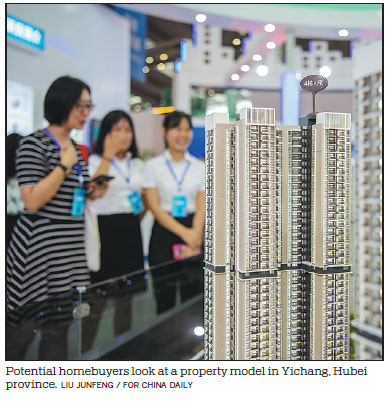Property prices remain stable in 70 major cities
House prices in major Chinese cities remained stable in August as the government continued to implement strict regulation of the real estate market, official data showed on Tuesday.
The National Bureau of Statistics reported that new home prices in China's four first-tier cities (Beijing, Shanghai, Guangzhou and Shenzhen) rose 0.3 percent month-on-month, reporting the same increase as the previous month.
Meanwhile, the price of secondhand housing in the four first-tier cities was flat compared with the previous month. On a yearly basis, prices decreased by 0.2 percent, marking the first decline since last June.
The NBS monitors house prices in 70 major Chinese cities, including 31 second-tier and 35 third-tier cities.
Among the 70 cities, 55 cities reported growth in new house prices, a drop from 60 cities in July. And 43 cities reported growth in prices of second-hand residential buildings, compared to 48 cities in July.
"In August, there was a significant fall in the number of cities reporting housing price spikes. And we have witnessed a price drop in 20 cities for the third consecutive month," Zhang Dawei, chief analyst at property agency Centaline, wrote in an article posted on his WeChat account.
In August, new home prices and the second-hand housing prices in 31 second-tier cities rose by 0.5 percent and 0.2 percent month-on-month respectively, both being 0.2 percentage point lower than the previous month.
Data from the NBS showed new house prices soared 0.7 percent on a month-on-month basis in 35 third-tier cities in August, the same growth rate compared to the previous month.
The prices of second-hand residential buildings in 35 cities rose by 0.8 percent month-on-month, 0.1 percentage point higher than July.
NBS Chief Statistician Kong Peng said the property market continued its steady run in August as the central government has reiterated the principle of "housing is for living in, not for speculation", calling for a long-term mechanism to maintain the sound development of the real estate market, and not to use real estate as a short-term means of stimulating the economy.
The signs of cooling in China's house prices came amid slower growth in investment in the property market.
Investment in real estate development in the first eight months rose 10.5 percent year-on-year, 0.1 percentage point lower than the first seven months. Among the total investment, investment in residential buildings surged 14.9 percent, 0.2 percentage point lower than the first seven months.
Zhang noted that China has rolled out 367 policies in the first eight months of this year to regulate the housing market, saying that the government's tightening restrictions will continue to cool the market.
"The 'Indian summer' in the property market is over. And I do not expect a "golden September and silver October", which is the traditional hot season for the property market," Zhang added.
ouyangshijia@chinadaily.com.cn

(China Daily Global 09/18/2019 page8)


















